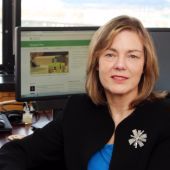
Lesley Cormack, PhD University of Toronto, MA University of Toronto, BA Honors University of Calgary
Contact
Faculty of Arts - Deans Office
- lcormack@ualberta.ca
Overview
About
Key achievements
- Led two strategic planning processes, resulting in an Arts Academic Plan, 2011-16 and an Arts Strategic Academic Strategic Plan, Change for Good, 2017-22. Both involved significant consultation and stakeholder engagement.
- Led a significant plan for increasing indigenous engagement through respectful relations. Have achieved 100% increase in undergraduate Indigenous students; have now hired 14 new indigenous scholars a faculty members; are working to develop indigenous curriculum.
- Enhanced support for research, particularly interdisciplinary research, first through the development and structuring of the Kule Institute for Advanced Studies (made possible by a $4 million donation), second through the development of an Arts led process of identifying signature areas of research
- Raised $36 million in philanthropic gifts in the past six years
- Managed finite resources through an administrative reorganization in 2012
- Supported a responsible and responsive rethinking of program offerings, closing 20 very small programs and supporting the development of 5 new programs (including a BA in Media Studies, an MA in Policy Studies and a new BA in Modern Languages and Cultural Studies)
- Worked with outside consultants to develop new brand for Faculty
Research
Books
A History of Science in Society: From Philosophy to Utility. With Andrew Ede. Peterborough: Broadview Press, 2004. 458 pp. (Nominated for an Alberta Book Award, 2004). Second edition, University of Toronto Press, 2012.
A History of Science in Society: A Reader. With Andrew Ede. Peterborough: Broadview Press, 2007. 470 pp.
Making Contact: Maps, Identity, and Travel, co-edited with Glenn Burger, Jonathan Hart, and Natalia Pylypuik. Edmonton: University of Alberta Press, 2003. xxx, 269 pp.
Charting an Empire: Geography at the English Universities 1580-1620. Chicago: University of Chicago Press, 1997. xiii, 281 pp.
Articles:
“The role of Mathematical Practitioners and Mathematical Practice in developing Mathematics as the Language of Nature”, The Language of Nature: Reassessing the Mathematization of Natural Philosophy, ed. Geoffrey Gorham and Benjamin Hill. University of Minnesota Press, 2015 forthcoming.
"That before Columbus geographers and other educated people thought that the Earth was flat." Newton’s Apple and other Myths about Science, edited by Ronald Numbers and Kostas Kampourakis. Harvard University Press, 2015 forthcoming.
“Forms of Nation and Forms of Geography: Chorography and its publics in Early Modern England”, in Forms of Association: Making Publics in Early Modern Europe, volume in honour of Richard Helgerson, eds. Paul Yachnin and Marlene Eberhart. University of Massachusetts Press, 2015: pp. 155-175.
“Ptolemy at Work: The role of the Geographia in Geography and Mathematics Teaching in Early Modern England”, Ptolemy's Geography in the Renaissance, Z. Shalev and C. Burnett, eds. London: Warburg Institute, 2010, pp. 207-224.
“The World at your fingertips: Renaissance Globes as Cosmographical, Mathematical and Pedagogical Instruments”, in Current Issues in Early Modern Cosmography, ed. Sven Dupré. Special issue of Archives Internationales d'Histoire des Sciences 59 (no. 163, 2009): pp. 485-497.
“Glob(al) Visions: Globes and their Publics in early modern Europe”. In Making Publics in Early Modern Europe: People, Things, Forms of Knowledge. Eds. Paul Yachnin and Bronwen Wilson. Routledge University Press, 2009, pp. 138-156.
Papers Presented:
“The whole earth, a present for a Prince: Molyneux’s Globes and the creation of a global vision in Renaissance England", Invited keynote address at Pacific Northwest Renaissance Conference, UBC-O, October, 2014.
“Globes on Shipboard. Mathematical Instruments and their Embodied Uses, 16th – 17th centuries”, Situating Science Workshop: Spaces of Science, University of Saskatchewan, September, 2014.
“That before Columbus geographers and other educated people thought the Earth Was Flat”, Historical Myths about Science, Washington and Lee University, Lexington, May 2014.
“The Molyneux Globes and the Vision of Empire” From Defining Lines to Lines of Control: Cartography and the British Empire, Duke University, January, 2014.
Panel participant, “The Future of the PhD in the Humanities”, McGill University, October, 2013; ACUTE/CSHPS joint session, Congress for the Humanities and Social Sciences, Brock University, 2014.
Public Lectures:
“Anatomy, Humours, and Chemical interventions: The changing face of Medicine in the Elizabethan Age”, for “And there’s the humour of it: Shakespeare and the Four Humours” exhibition, University of Alberta, February 21, 2014.
“The Real Philosopher's Stone: Natural Philosophy and Natural Magic in the Middle Ages and Renaissance” Harry Potter exhibition, University of Alberta, January, 2012.
“Kepler and the Music of the Spheres”, Montreal Baroque Music Festival, June 2010.
“Galileo and the church in the international year of the telescope”, Vancouver Space and Science Centre, November 2009.